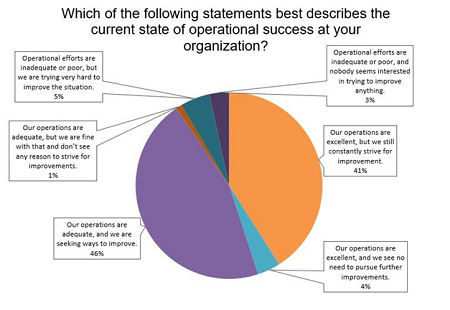The EHS Daily Advisor recently partnered with Sphera® to conduct research into the link between safety and operations. The resulting report, Realizing Operational Excellence Through Safety Culture and Leadership, is now available—read on for some key highlights from our study, along with details on how you can download your free copy of the report.
Of course, different industries are going to have different goals when it comes to their operations; those in manufacturing will have a different approach than those in construction or chemical production or utilities. So, our definition of operational excellence in the Realizing Operational Excellence Through Safety Culture and Leadership Survey was “The workplace philosophy where the combination of problem-solving, teamwork, and leadership results in ongoing improvement in an operation.” Under this model, employees are positive and empowered to do the right thing the right way—every time. As we know in the environment, health, and safety field, accidents often have several root causes, but one of the most frequent of those causes is worker behavior. Therefore, we hypothesized that safety leadership and culture have a strong link to operational excellence.
Our research into this safety-operations link couldn’t have come at a more appropriate time, as it’s a very hot topic right now for EHS professionals. At the 2018 National Safety Council (NSC) Congress & Expo in Houston, Dr. David Michaels, the longest-serving head of OSHA, copresented with Colin Duncan a session titled The Impact of Safety on Operational Performance. In this talk, Dr. Michaels described how we will continue to see a great deal of research in the coming years into the relationship between safety and operations.
Let’s take a look at a couple of highlights from our study.

A Constant Pursuit of Improvement
Among our survey participants, the pursuit of improvement was a common theme. This striving to better operations is occurring no matter the level of current operational success, meaning that those who indicated that their operational efforts were excellent were just as likely to be pursuing improvements as those who reported that their current state of operations was poor or adequate. As you can see in the chart at left, an overwhelming majority of 92% of respondents said that seeking improvement was an important part of their operational status.
The chart also shows that 92% of survey takers consider their operations to be adequate or excellent; however, in follow-up questions that we address in the full report, it became clear that a smaller share of participants (generally about two-thirds up to 80%) were actually confident that they are doing all that they can in their current safety programs, from leadership to training, in order to boost operational excellence.
The Single Most Important Contributor to Operational Excellence
Our survey data also revealed some surprising attitudes toward what contributes to operational excellence. We asked our respondents what their company—and not them personally, which is an important caveat—deems the single most important contributor to superior operational performance. Two factors stood out above all the rest, each selected by 24% of participants. These factors were:
- Integrity and/or respect; and
- Engaged effort.
Also highly valued was proper training, a operational factor that was considered most important to 17% of those polled.
Why is this surprising? Because these factors that are strongly related to safety culture were much more highly valued than other, more traditional measures of operational excellence. Some of these more traditional measures that were not as highly valued among our response pool were quality of product (13%) and even profitability (12%). Timeliness and/or speed, usually considered to be a huge indicator of successful operational effort, was considered the most important factor by a mere 3% of survey participants.
These findings provide evidence in support of our hypothesis—safety culture and leadership are absolutely indispensable for organizations that are seeking true operational excellence.
Download the Full Report to Learn More!
You can read about the rest of our study’s results in our survey report, where we examine how safety culture, leadership, and EHS initiatives are driving operational excellence at organizations today. We uncovered:
- How does safety culture boost operations?
- Where could it be improved?
- How is the effect of safety performance on operational success measured?
- What are some popular operational philosophies and methodologies being used by EHS professionals today?
Find the answers in this free survey report.


